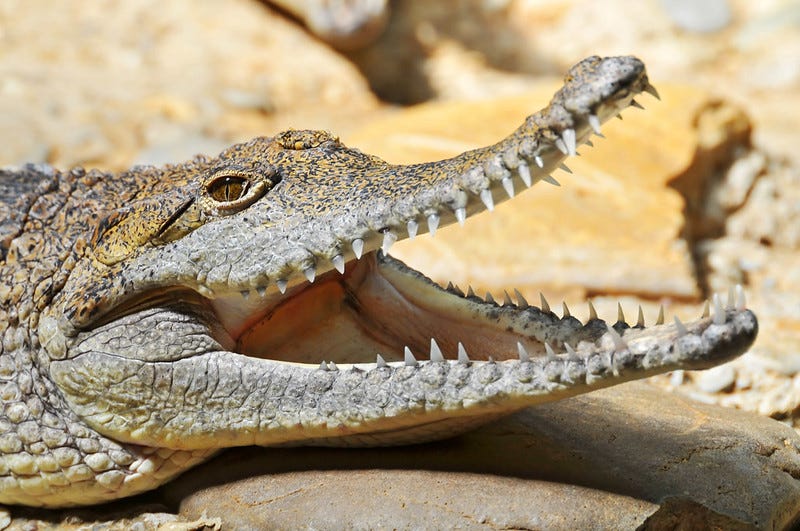Wildlife 'influencers' in spotlight after croc-wrestling investigation
The ethics of supposedly 'educational' nature content is a thorny issue
Social media influencers in the wildlife space have been feeling the heat in recent weeks.
Last week, we brought you the story of Mike Holston, the US influencer who travelled to Australia to film himself wrestling crocodiles. Holston, who goes by the name “therealtarzann” online, was filmed slowly lowering himself into a creek with a crocodile visible in the distance. After a short chase, Holston is shown holding an apparently docile croc by the neck.
He is now being investigated by Australian authorities where interfering with a crocodile can result in fines of up to $24,800. He has claimed his videos are for educational purposes.

This week, a hunting influencer in the US has been charged with wildlife crimes. Ryan Lampers, known online as “StHealthyHunter”, has been charged with unlawfully killing a deer, as well as other accusations of lying about where he killed a wolf and a mountain lion. These animals can only be hunted in certain designated areas.
We all know how social media encourages competition and one-upmanship. Some other wildlife influencers have suggested Lampers may have fallen victim to a sort of race to kill the biggest and most impressive animals.
These incidents raise questions about the ethics of using nature to drive social media engagement. Some argue that educating the public about wildlife could lead to more knowledge about environmental protections. But others will say that wild animals should not be used for viral content.
There is evidence that conservation content online can make a difference. But the line between positive and harmful content is not always an easy one to draw.
USA: A routine bust in March 2024 turned into one of the largest deer smuggling cases in Texas history. The investigation into “ghost deer”, animals moved without proper paperwork and identification, has resulted in 1,200 charges against 22 people. Conservationists warned that the illegal movement of captive deer risks spreading disease which could devastate deer populations. (The Wildlife Society)
Turkiye: A baby gorilla rescued from traffickers in Istanbul will be returned to its native Nigeria after nine months. Zeytin, as he was named by his rescuers, has been recovering in a zoo close to Istanbul where his keepers say he is now well enough to return. Zeytin belongs to a critically endangered species of gorilla and was the first ever to be confiscated in Istanbul. He had been kept in a small box and was extremely distressed. Traffickers had been attempting to transport him to Thailand. (France 24)
Latin America: At least 146 environmental defenders were killed or have gone missing globally in 2024, with Latin America again proving to be the most dangerous place to be an activist. More than 80 per cent of those cases were in the region, according to the latest report from Global Witness. Colombia was the deadliest country, with 48 deaths, with Guatemala second and Mexico third. (AP)
Nigeria: Pangolins are mainly hunted for meat not scales in southeastern Nigeria, according to a new study. Nearly 200 tonnes of scales has been seized in Nigeria since 2010 and the trade is understood to be a major driver in the species’ decline. However, research by Charles Emogor of Cambridge University has suggested that hunters mainly target them for their meat. (Mongabay)
USA: Meat from critically endangered sharks is being sold with false labels in the USA, according to a study from the University of North Carolina. Researchers purchased 30 shark products between 2021 and 2022, including steaks and jerky. Using DNA barcoding, it was established that just under a third of the products were found to originate from species classified as endangered or critically so. (Bioengineer)
Brazil: The most vulnerable cannot continue being the main victims of crime in the Amazon, according to President Lula. He was speaking at the formation of a new international taskforce aimed at combating environmental crimes and smuggling. Brazil’s left-leaning leader said that the protection of indigenous people living in the rainforest must be prioritised. (Agencia Cenarium)
UK: Police are investigating after seven birds of prey were apparently killed in Lincolnshire. The incident is being treated as suspected wildlife crime, although the cause of death has not yet been confirmed. (Raptor Persecution UK)
South Africa: Two Germans were arrested in Pretoria suspected of illegally catching protected geckos and attempting to sell them. The pair were also in possession of some tortoise species and authorities said they were intending to smuggle them out of the country. International trade in all South African tortoises is prohibited by the CITES treaty. (The Post)
Thailand: Some 187 tortoises were seized at the international airport in Bangkok. The animals are native to Egypt and are protected under international law and treaties. The individual in possession of the tortoises did not have the correct export documents, authorities said. The animals will be cared for in Thailand before being returned to Egypt. (The Nation)
USA: A restaurant owner illegally purchased 24 black bear paws from an undercover officer in late 2021. Yan Li, from Washington state, was sentenced to house arrest and fined after purchasing the animal parts, as well as gallbladders from waterfowl. The parts can sell for thousands of dollars overseas, according to authorities. (Seattle Times)
Thank you so much for reading Wild Crime. This is a fully reader-supported publication with no outside funding. Paid subscriptions make it possible for us to dig deeper and pursue investigations that take time and resources. But even if you’re reading for free, you’re helping to keep this work alive, and I’m grateful for that.
If you’d like to support Wild Crime further, consider becoming a paid subscriber or sharing this newsletter with someone who might find it interesting. Every bit of support makes a real difference.

